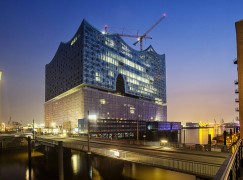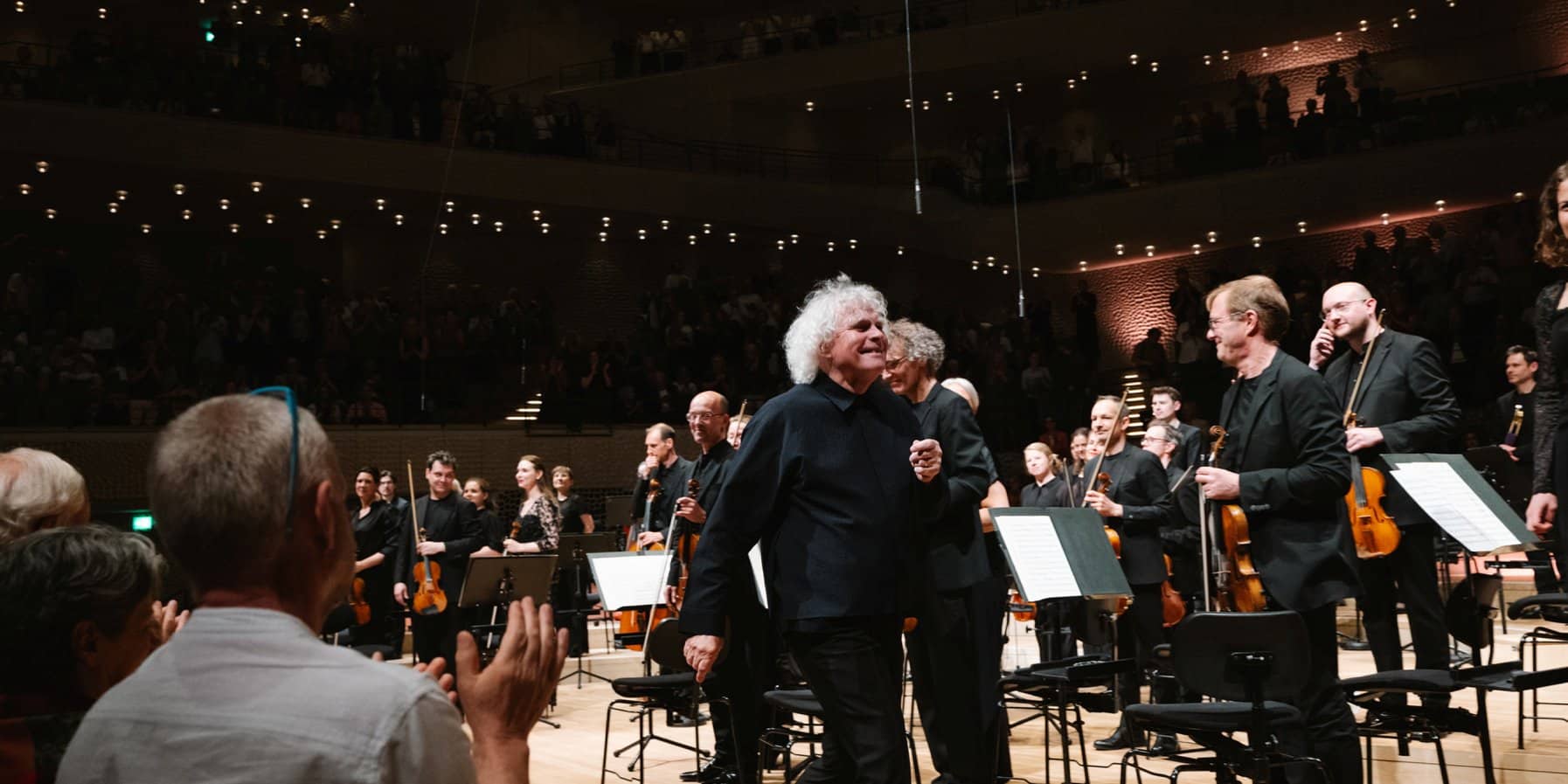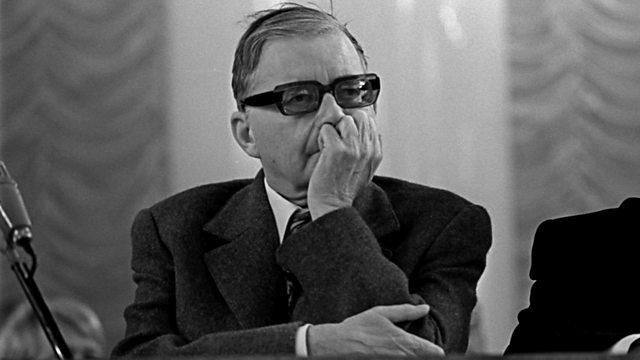Dude gets to conduct first Beethoven cycle in Hamburg’s new hall
mainAll the big beasts are lined up for the opening year of the Elbphilharmonie – Muti, Chailly, Rattle, Barenboim, Bychkov – but it’s Gustavo Dudamel who wins the honour of conducting the first Beethoven cycle, all nine symphonies in five nights with his Bolivar band.
Media announcement below:

Today the Elbphilharmonie & Laeiszhalle Hamburg’s upcoming 2016/17 season was presented to the public. In the presence of the city’s First Mayor Olaf Scholz and the Director of NDR (North German Radio) Lutz Marmor, theGeneral and Artistic Director Christoph Lieben-Seutter gave a succinct overview of the programme. The Elbphilharmonie officially opens in January 2017, thus the press conference was held on the third level of the car park. Projected onto the walls of the spiral car ramp were large artworks – examples of the Elbphilharmonie’s current street art project. This project accompanies the launch of the upcoming programme and will remain visible throughout the city leading up to the opening in nine months. A Hamburg-based group of street artists has worked intensely over the past few days, painting, spraying and designing adventurous and catchy artworks that promote selected events from the new season, for example, the »Salam Syria« festival and »Viva Beethoven« – a series that features Gustavo Dudamel and his Orquesta SSB. They perform all of Beethoven’s symphonies on five consecutive evenings.
The grand opening of the Elbphilharmonie is the unrivalled highlight of Hamburg’s 2016/17 concert season. The inaugural concerts performed by the NDR Elbphilharmonie Orchestra and conducted by Thomas Hengelbrock on 11 and 12 January 2017 form the prelude to an intense programme that demonstrates the new concert hall’s musical aptitude over a period of five months. The target audience comprises music lovers and classical music connoisseurs from far and wide, and people who have awakened their curiosity of music through interest in Hamburg’s new architectural landmark. Elbphilharmonie aims to be a »Concert Hall for Everyone«: the publicly accessible Plaza opens on 4 November 2016 already and the Elbphilharmonie’s concert programme appeals to all due to its carefully structured design, quality and accessibility. The season begins on 6 September 2016 with a guest performance by theLucerne Festival Academy in the Laeiszhalle, continues there for four months and from 11 January 2017, runs parallel in both concert halls.





Of interest to the reader might be also be that the inaugural concert will include a new piece of Wolfgang Rihm performed by selected soloists (Bryn Terfel, Jonas Kaufmann, Anja Hateros, Wiebke Lehmkuhl, Iveta Apkalna …). Would be great to be there …
Interestingly, not a single British orchestra features in the opening season.
You are correct. But the new season in the new building lasts only 6 months. At least at the old place the LPO will perform under Robbin Ticciati (Nov. 11th). Perhaps it is comforting that this more British presence than in the current season. I did not have a close look on the current programm, however “quick and dirty” I could not identify any British orchestra.
Since the Hanseatic city uses its PR machine again and again to underline its credentials as supposedly the most Anglophile place in Germany, the absence of any British orchestra exposes the hollowness of this claim. Other activities in the Laeiszhalle are entirely irrelevant in this respect.
Huh? Is this satire?
“The dude abides”
Let’s hope the acoustics of the hall justify the attention these big names are giving it. From pictures online, it is a surround-seating venue with a substantial portion of the seats to side and rear of the orchestra, which itself is pretty much in the middle of the space, away from large reflective surfaces essential for the low frequencies. The main floor seats will likely also lack strong lateral reflections from side walls essential for creating the sense of sonic envelopment. It definitely will not sound like a shoebox venue. But it might be a good space to make recordings.
True words. Those who know about acoustics, also know what is likely to happen when this new hall opens. The acoustics will be “underwhelming”. Quite intimate though, sound travelling directly from the stage can be heard well, but totally disappointing in envelopment and strength of the sound for big orchestra scores. No goosebumps in the climaxes of the great works. no warmth, weak in the bass.
Then the game goes as follows: Some critical voices will appear. The acoustician will claim, that in any new hall the orchestra needs a few months to get used to it. Also he will claim, that the wood and other materials in the hall need to “settle”, so we have to wait a few years… While there can be a grain of truth in both generic statements, it also buys time to deflect the discussion during the initial shock…
In public, any critic will be hushed, “you want to keep getting the free tickets, don’t you”? Faces must be saved, too much money has been spent to allow a free discussion about problems. Failure is not an option, the PR will be accordingly.
Local patriotism and pride will be another force that helps to silence the critics.
And then the orchestra will experiment for years and buy expensive risers for the Violoncelli and Double basses, which will not help much to remedy the lack of bass energy, since the layout is fundamentally wrong, but admitting the collective failure is not an option, the hundreds of millions have been spent. Architect and acoustician are laughing all the way to the bank. Maybe they will even do some modifications after a few years, raising the stage, changing absorption factors, even experiment with electronic means, like the other all around halls…
And so the world will get another “Emperor’s new Concert Hall” that is unsuitable for music, but great for watching conductor’s impressive left hand movements and the back of singer’s hairdo. You want to hear the singers too? You have to buy an expensive seat in front of them. Wonder about why the architect and builders are preaching the “democratic layout” of the layout with people all around? So do we, who can listen, since it is actually the most aristocratic and segregated layout imaginable. Less percentage of good seats than in a traditional “shoe box”. If you talk about hearing, not looking, that is…
You want to experience an enveloping acoustic, that transmits the emotions with the music best? Well, you have go to a real concert hall. This is a hall for watching music, not for hearing it. Maybe that’s actually what the majority really wants, so who are we minority of music lovers, to complain?
It’s the age of narcissism, the iAge.
Perfect for the Dude and his Bolivar band.
I agree that Hamburg is totally using the Bolivar band to test run their new hall, running though the Beethoven 9 symphonies in 5 days to tweak acoustics.
Does anyone expect recoding-quality concerts to come out of it?
“Live from the Elbphilarmonie!
Inaugural Concerts!
Virgin Hall, Virgin Sound!
Once in a Lifetime Experience with Gustavo Dudamel!”
That’s not how it works. You don’t “tweak acoustics” during a concert cycle of a few Beethoven Symphonies. Please curb the uninformed speculation.
Maybe they can record and film concerts there beautifully and then transmit it to the outer world. And the recording engineers will make the sound, bypassing the acoustician to a degree. So it could be a great recording studio for classical music in other words. Pity only for the 2000 people who sit in flesh in the actual audience and get served a substandard acoustic for state of the art prices and top artists on stage.
We can’t have everything apparently.
I don’t know if many major orchestras would want to spend a week in Hamburg testing out a new hall. I mean, it isn’t exactly an invitation to a residence at the Musikverein or Carnegie Hall. The Dude and his Band were available.